- Home
- Alice Munro
Lives of Girls and Women Page 15
Lives of Girls and Women Read online
Page 15
We started going to the Town Hall for our practising. The Town Hall auditorium was large and draughty, as remembered, the stage curtains ancient dark blue velvet, gold-fringed, royal, as remembered. The lights were on, these winter-dimmed days, but not all the way to the back of the hall, where Miss Farris would sometimes disappear, crying, “I can’t hear a word back here! I can’t hear a word! What are you all afraid of? Do you want the people at the back of the hall to be calling out for their money back?”
She was approaching her peak of despair. She always had some sewing in her hands. She beckoned me over, one day, and gave me a scrap of gold braid which she was sewing onto the Mayor’s velvet hat. She told me to run to the Walker Store and get a quarter of a yard to match. She did quiver; the hum in her had got more noticeable. “Don’t delay,” she told me, as if she was sending me for some vital medicine, or with a message that would save an army. So I flew out in my unbuttoned coat and there was Jubilee under fresh snow, its silent, woolly white streets; the Town Hall stage behind me seemed bright as a bonfire, lit by such fanatical devotion. Devotion to the manufacture of what was not true, not plainly necessary, but more important, once belief had been granted to it, than anything else we had.
Freed by the operetta from the routine of our lives, remembering the classroom where Mr. McKenna kept busy with spelling bees and mental arithmetic those not chosen, as someplace sad and dim, left-behind, we were all Miss Farris’s allies now. We were putting our separate parts of the operetta together, seeing it as a whole. I was moved by the story, and still am. I thought how separate, and powerful, and helpless and tragic a character the Pied Piper was. No treachery could really surprise him; battered by the world’s use of him, he kept, like Humphrey Bogart, his weary honour. Even his revenge (spoiled of course by the changed ending) seemed not spiteful, but almost tender, terrible tender revenge in the interests of larger justice. I thought Frank Wales, that unteachable speller, grew into the part easily, naturally, with no attempt at acting. He carried his everyday reserve and indifference on to the stage, and this was right. I saw for the first time what he was like, what he looked like— his long narrow head, hair dark and cut short like a wiry doormat, a melancholy face that might have turned out to be a comedian’s though in this case it did not, the scars of old boils and a fresh one starting, on the back of his neck. His body was narrow like his face, his height was average for a boy in our class—meaning he would be a fraction of an inch shorter than I was—and he had a quick and easy way of walking, the walk of someone who does not need either to efface or call attention to himself. Every day he wore a blue-grey sweater, darned at the elbow, and this smoky colour, so ordinary, reticent, and mysterious, seemed to me his colour, the colour of his self.
I loved him. I loved the Pied Piper. I loved Frank Wales.
I had to speak about him to somebody so I spoke to my mother, pretending objectivity and criticism.
“He has a good voice but he is not tall enough. I don’t think he’ll stand out on the stage.”
“What is his name? Wales? Is he the son of that corset-lady? I used to get my corsets from Mrs. Wales, she had the Slender-eze line, she doesn’t have it any more. She lived out on Beggs Street, past the Creamery.”
“It must be his mother.” I was strangely elated to think there had been this point of contact between Frank Wales’s family and mine, his life and mine. “Did you go to her house, did she come here?”
“I went to her, you had to go to her.”
I wanted to ask what the house was like, were there pictures in the front room, what did his mother talk about, did she mention her children? Too much to hope that they would have become friends, that they would talk about their families, that Mrs. Wales would say that night at supper, “Today there was such a nice lady here to get her corsets fitted and she says she has a daughter in the same class at school as you—” What good would that do? My name mentioned in his hearing, my image brought before his eyes.
The atmosphere of the Town Hall, these days, put more than me in this condition. Ritualized hostility between boys and girls was cracking in a hundred places. It could not be kept up or, where it was kept up, it would be in a joking way, with confused undercurrents of friendliness.
Naomi and I, walking home, ate five-cent toffee bars which were extremely hard to bite in the cold, and then almost as hard to chew. We talked with cautious full mouths.
“Who would you like to be your partner if it didn’t have to be Jerry Storey?”
“I don’t know.”
“Murray? George? Dale?”
I shook my head securely, noisily sucking back toffee-flavoured saliva.
“Frank Wales,” said Naomi diabolically.
“Tell me yes or no,” she said. “Come on. I’ll tell you who I would like if it was me.”
“I wouldn’t mind him,” I said in a careful, subdued voice. “Frank Wales.”
“Well I wouldn’t mind Dale McLaughlin,” said Naomi defiantly and quite surprisingly, for she had kept her secret hidden better than I had mine. She hung her head over a snowbank, dribbling, and gnawed at her toffee-bar. “I know I must be crazy,” she said finally. “I really like him.”
“I really like Frank Wales,” I said in full admission. “I must be crazy too.”
After this we talked all the time about these two boys. We called them F. A.’s. It stood for Fatal Attraction.
“There goes your F.A. Try not to faint.”
“Why don’t you get your F.A. some Noxema for his boils, ugh?”
“I think your F.A. was looking at you but it’s hard to tell with his crosseyes.”
We developed a code system of raised eyebrows, fingers fluttered on the chest, mouthed words such as Pang, oh, Pang (for when we stood near them on the stage). Fury, double Fury (for when Dale McLaughlin talked to Alma Cody and snapped his fingers against her neck) and Rapture (for when he tickled Naomi under the arm and said, “Out of my way, butterball!”).
Naomi wanted to talk about the incident in the bicycle shed. The girl Dale McLaughlin had done it to, asthmatic Violet Toombs, had moved away from town.
“Good thing she moved. She disgraced herself here.”
“It wasn’t all her fault.”
“Yes it was. It’s the girl’s fault.”
“How could it be her fault if he held her down?”
“He couldn’t have held her down,” said Naomi sternly, “because he couldn’t hold her down and—get his thing in—at the same time. How could he?”
“Why don’t you ask him? I’ll tell him you want to know.”
“My mother says it’s the girl’s fault,” said Naomi, ignoring me. “It’s the girl who is responsible because our sex organs are on the inside and theirs are on the outside and we can control our urges better than they can. A boy can’t help himself,” she instructed me, in a foreboding, yet oddly permissive, tone of voice, which acknowledged the anarchy, the mysterious brutality prevalent in that adjacent world.
Talk along these lines was irresistible, and yet, walking on down River Street, I often wished I had kept my secret to myself, as we all do wish we had kept our secrets to ourselves. “Frank Wales can’t get hard-ons yet because his voice hasn’t changed,” Naomi told me—no doubt relaying another piece of information from her mother—and I was interested but disturbed, as if I had got my feelings about him wrongly labelled, directed into an entirely unexpected channel. What I wanted from Frank Wales I did not really know. I had a daydream about him, often repeated. I imagined he walked home with me after a performance of the operetta. (It was becoming known that boys— some boys—would walk home with girls—some girls—on that night, but Naomi and I did not even discuss this possibility; we were chary of voicing real hopes.) We walked through the absolutely silent streets of Jubilee, walked under the street lights with our shadows whirling and sinking on the snow, and there in the beautiful, dark, depopulated town Frank would surround me, either with real, implausible, but cool and te
nder, singing, or, in the more realistic versions of the dream, simply with the unheard music of his presence. He would be wearing the pointed cap, almost a fool’s cap, and the cloak patched with various colours, predominantly blue, that Miss Farris had made for him. I would often invent this dream for myself at the edge of sleep, and then it was strange how content it would make me, how it would make peace and consolation flow, and I would close my eyes and float on it into my real dreams which were never so kind, but full of gritty small problems, lost socks, not being able to find the Grade Eight classroom, or terrors, such as dancing on the hall stage and finding I had forgotten to put my headdress on.
At the Dress Rehearsal Miss Farris cried for all to hear, “I might as well leap off the Town Hall! I might as well leap now! Are you all prepared to take the responsibility?” She pulled her spread fingers down her cheeks so hard it looked as if they might leave furrows. “Back-back-back, forget the last fifteen minutes! Forget the last half-hour! Begin again from the beginning!” Mr. Boyce smiled quite comfortably and struck the notes of the opening chorus.
THEN THE NIGHT ITSELF. The Time come, the audience packed in, all that shuffling coughing dressed-up expectancy where we were used to having darkness and echoes. The stage was so much brighter and so much more crowded, with cardboard house-fronts and a cardboard fountain, than we had ever known it to be. Everything happened too quickly, and then it was over, gone; it did not matter how it was done, it had to do, could not be retrieved. Nothing could be retrieved. After all the practising it was almost unbelievable that the operetta was really happening. Mr. Boyce wore tails, which people would say looked ridiculous.
The Council Chambers directly below the stage—and connected to it by a back staircase—were divided into dressing rooms with sheets hung on cords, and Miss Farris with an apron over her new, peplumed, cerise pink dress was painting eyebrows and mouths, putting red dots at the corners of eyes, dabbing ochre on earlobes, dousing hair with cornstarch. There was a terrible uproar. Vital parts of costumes were lost; somebody had stepped on the hem of the Mayor’s wife’s dress, ripping it out at the waist. Alma Cody claimed she had taken four aspirins for her nerves and now was dizzy and in a cold sweat, sitting on the floor, saying she was going to faint. Some of the sheets fell down. Girls were seen in their underwear by boys, and vice versa. Members of the chorus who were not supposed to enter the Council Chambers at all, got in and lined up boldly in their dark skirts and white blouses, and Miss Farris, past noticing, went ahead and painted their faces too.
She was past noticing much. We expected her to be wild, as she had been all week. Nothing of the sort. “I wonder if she’s drunk,” said Naomi, applecheeked in her motherly kirtle. “I smelled a smell on her.” I had not smelled a thing but Wild Roses Toilet Water and a whiff of that peppery sweat. However she glittered—sequins outlining the jacket of her dress in circus-military style—and she glided, unlike herself, speaking softly, moving through all this turmoil with bountiful acceptance.
“Pin up your skirt, Louise,” she said to the Mayor’s wife, “there isn’t a thing you can do about it now. From the audience it won’t be noticed.”
Won’t be noticed! She who had been so hard-to-suit about the smallest details, had forced mothers to rip things out and do them three times over!
“A big strong healthy girl like you could take six aspirins and never blink an eye,” she said to Alma Cody. “Up on your feet, my lady!”
The dancers were dressed in bright cotton skirts, red, yellow, green, blue, and white embroidered drawstring blouses. Alma had loosened the drawstring of her blouse to show the impudent beginnings of her bust. Even that, Miss Farris just smiled at, and floated by. Anything that wanted to, it seemed, might happen now.
Near the beginning of the dance my headdress, a tall medieval cone of cardboard wrapped in yellow net, with a bit of limp veil, began to slide slightly, disastrously to the side of my head. I had to tilt my head as if I had a wry neck, and go all through the dance like that, teeth clenched, glassily smiling.
After “God Save the King,” after the last curtain, we ran up the street to the photographer’s, all in our costumes still, without coats, to have our pictures taken. We were all crushed together, waiting, among the sepia waterfalls and Italian gardens of his discarded backdrops. Dale McLaughlin found a chair, the kind in which fathers of families used to sit for their pictures, wife and children clustered round them. He sat down, and Alma Cody sat boldly on his knee. She flopped against his neck.
“I’m so weak. I’m a wreck. Did you know I took four aspirins?”
I was standing in front of them. “Sit down, sit down,” said Dale jovially, and pulled me down on top of Alma, who screamed. He opened his long legs and dumped both of us on the floor. Everybody was laughing. My hat and veil had fallen right off, and Dale picked it up and set it on my head backwards so the veil fell over my face.
“You look gorgeous like that. Can’t see a thing.”
I tried to dust it off and get it on the right way. Frank Wales appeared suddenly between the curtains, after having his picture taken, alone, in his lordly, beggarly costume.
“Dancers! Next!” called the photographer’s wife, angrily, sticking her head through the curtains. I was the last to go in, because I was still trying to get my headdress on properly. “Look in my glasses,” Dale said, so I did, though it was distracting seeing his lonely, crossed eye behind my reflection. He was making leering faces.
“You ought to walk her home,” he said to Frank Wales.
Frank Wales said, “Who?”
“Her,” said Dale, nodding at me. My head bobbed in his glasses. “Don’t you know her? She sits in front of you.”
I was afraid it would turn out to be a joke. I felt sweat start out of my armpits, always the first sign of fear of humiliation. My face swam in Dale’s foolish eyes. It was too much, too dangerous, to be flung like this into the very text of my dream.
However Frank Wales said consideringly, and as gallantly as anybody could, “I would too. If she didn’t live such a long ways out.”
He was thinking of when I lived out on the Flats Road, and was famous in the class for my long walk to school. Didn’t he know I lived in town now? No time to tell him; no way, either, and there was still the smallest risk, that I would never take, of having him laugh at me, his quiet, reflectively snorting laugh, and say he was only kidding.
“All dancers!” cried the photographer’s wife, and I turned blindly and followed her through the curtains. My disappointment was after a moment drowned in gratitude. The words he had said kept repeating themselves in my mind, as if they were words of praise and pardon, the intonation so mild, matter-of-fact, acknowledging and lovely. A feeling of rare peacefulness like that of my daydream settled on me during the picture-taking and carried me back through the cold to the Council Chambers and stayed with me while we changed, even with Naomi saying, “Everybody was killing themselves laughing, the way you held your head when you were dancing. You looked like a puppet with its neck broken. You couldn’t help it, though.” She was in a bad, and worsening, mood. She whispered in my ear, “You know all that stuff I told you about Dale McLaughlin? That was all a lie. That was all an act I put on to get your secrets out of you, ha ha.”
Miss Farris was automatically picking up and folding costumes. She had cornstarch spilled down the front of her cerise-pink dress, and her chest actually looked concave, as if something had collapsed inside it. She hardly bothered to notice us, except to say, “Leave the rosettes off your shoes, girls, leave those too. Everything will have its use another day.”
I walked around to the front of the hall and there was my mother waiting with Fern Dogherty, and my brother Owen in his flag drill outfit (the younger grades had got to do inconsequential things, like flag drill, rhythm band numbers, before the curtain went up on the operetta), poking his flag, which he had been allowed to keep, into a snowdrift.
“Whatever kept you so long?” my mother said.
“It was lovely, did you have a crick in your neck? That Wales boy was the only one on the entire stage who forgot to take his cap off for “God Save the King.” My mother had these various odd little pockets of conventionality.
What happened, after the operetta? In one week it had sunk from sight. Seeing some part of a costume, meant to be returned, hanging in the cloakroom was like seeing the Christmas tree, leaning against the back porch in January, browning, bits of tinsel stuck to it, reminder of a time whose hectic expectations, and effort, seem now to have been somewhat misplaced. Mr. McKenna’s solid ground was reassuring under our feet. Every day we did eighteen arithmetic problems, to catch up, and listened securely to such statements as, “And now because of the time we have lost we are all going to have to put our noses to the grindstone.” Noses to the grindstone, shoulders to the wheel, feet on the pedals—all these favourite expressions of Mr. McKenna’s, their triteness and predictability, seemed now oddly satisfying. We carried home large piles of books, and spent our time drawing maps of Ontario and the Great Lakes—the hardest map in the world to draw—and learning “The Vision of Sir Launfall.”
Everybody’s seat was moved; the housecleaning of desks and change of neighbours turned out to be stimulating. Frank Wales now sat across the room. And one day the janitor came with his long ladder and removed an object which had been visible in one of the hanging lights since Hallowe’en. We had all believed this to be a French safe, and Dale McLaughlin’s name had been connected with it; less scandalously, though just as mysteriously, it was discovered to be an old sock. It seemed to be a time for dispelling illusions. Getting down to brass tacks, Mr. McKenna would have said.

 Runaway
Runaway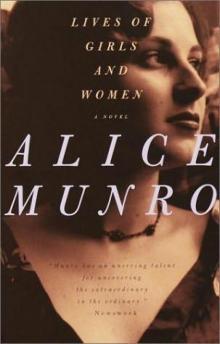 Lives of Girls and Women
Lives of Girls and Women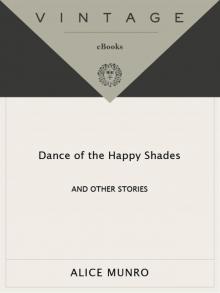 Dance of the Happy Shades
Dance of the Happy Shades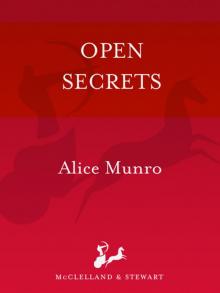 Open Secrets
Open Secrets Julieta (Movie Tie-in Edition)
Julieta (Movie Tie-in Edition)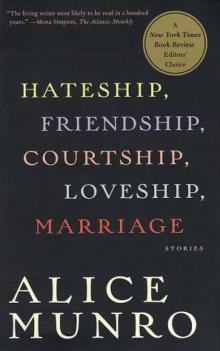 Hateship, Friendship, Courtship, Loveship, Marriage: Stories
Hateship, Friendship, Courtship, Loveship, Marriage: Stories Alice Munro's Best
Alice Munro's Best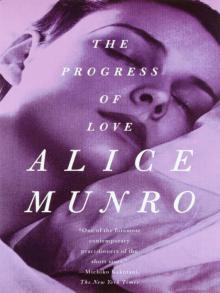 The Progress of Love
The Progress of Love Selected Stories
Selected Stories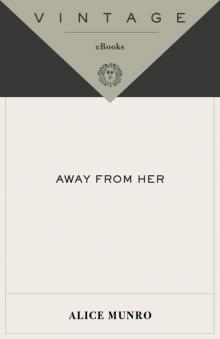 Away from Her
Away from Her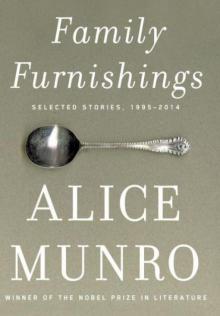 Family Furnishings
Family Furnishings Moons of Jupiter
Moons of Jupiter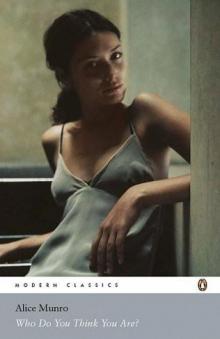 Who Do You Think You Are?
Who Do You Think You Are?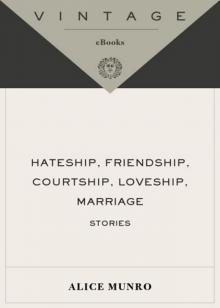 Hateship, Friendship, Courtship, Loveship, Marriage
Hateship, Friendship, Courtship, Loveship, Marriage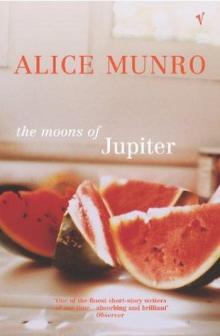 The Moons of Jupiter
The Moons of Jupiter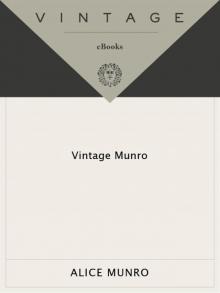 Vintage Munro
Vintage Munro The Love of a Good Woman
The Love of a Good Woman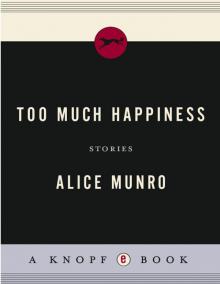 Too Much Happiness
Too Much Happiness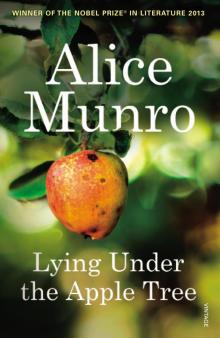 Lying Under the Apple Tree
Lying Under the Apple Tree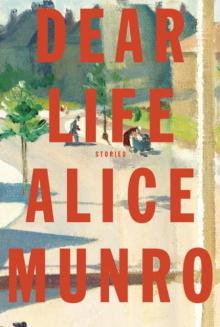 Dear Life
Dear Life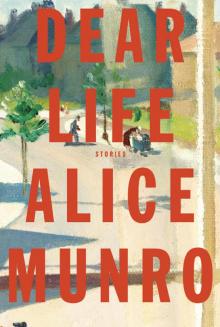 Dear Life: Stories
Dear Life: Stories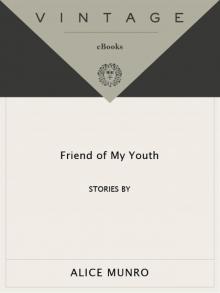 Friend of My Youth
Friend of My Youth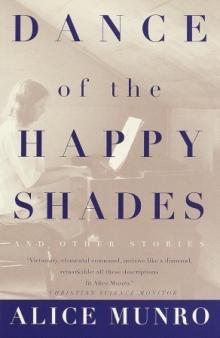 Dance of the Happy Shades: And Other Stories
Dance of the Happy Shades: And Other Stories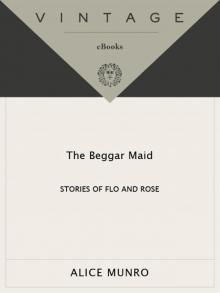 The Beggar Maid
The Beggar Maid